#english abolitionists
Link
#Slave Chair#England#john wesley#methodist#bristol uk#english abolitionists#british slavery of Black People#white supremacy#systemic racism
1 note
·
View note
Text
here's the thing about charles dickens. [discussion of his antisemitism, misogyny, and racism ahead.]
his last, unfinished novel, the mystery of edwin drood, features helena and neville landless, heroic and sympathetic south asian (sri lankan, specifically) characters, and the racism they endure in an english town is relevant to the plot to the point where neville ends up falsely accused of murder. in the wake of the indian rebellion of 1857, dickens applauded the english brutality against "that oriental race," and called for genocide.
fagin is called "the jew" 274 times in the first half of oliver twist. an article in the jewish chronicle asked why "jews alone should be excluded from the 'sympathizing heart' of this great author and powerful friend of the oppressed." at first, dickens dismissed this, and claimed he was just being accurate about london's criminal makeup. but he was moved enough by eliza davis's letters to him on the matter that he halted the printing of the latter half of oliver twist so he could change the text and remove the antisemitic language therein.
dickens was an abolitionist who despised chattel slavery in the united states, and called emancipation a "moral duty." dickens didn't think black americans were intelligent enough to vote, and he wrote an entire character in bleak house who is a joke to be disliked and mocked because she'd rather oversee charity missions to help children in africa than be a proper mother and tend to her own family at home in england.
speaking of one's own family at home in england, dickens smeared his wife, catherine hogarth, publicly so he could justify separating from her and taking up with a younger woman. catherine hogarth was likely mentally ill, likely living with postpartum depression. she was also an author in her own right and loved her family dearly. her reputation never recovered in her lifetime from the claims he made about her. in dickens's novels, time and time again, from nicholas nickleby to david copperfield to our mutual friend to the mystery of edwin drood, men who menace and take advantage of vulnerable women are portrayed as the worst kind of villains, deserving of whatever grisly ends come to them.
charles dickens was both privately and publicly a raging asshole in many ways and the world would be worse off without him, because he wrote for bourgeois, comfortable victorians, the very people who so often failed to "think of people below them as if they really were fellow-passengers to the grave, and not another race of creatures bound on other journeys." in the same breath that he calls agnes fleming, who opens oliver twist as an unwed mother dying in a workhouse, "weak and erring," he dares to add that "i do believe that the shade of that poor girl often hovers about that solemn nook-ay, though it is a church." he calculated jo's death to the page in bleak house for maximum effect. but when he wrote of the orphaned crossing-sweeper, "dead, your majesty. dead, my lords and gentlemen. dead, right reverends and wrong reverends of every order. dead, men and women, born with heavenly compassion in your hearts. and dying thus around us every day," people listened.
i dedicated years of my life to reading him and studying him and thinking about him and writing about him and his novels. now, i turn to condemn him; now, i turn to justify him. i wish i had a time machine so i could shake his hand. i wish i had a time machine so i could publicly debate him. i wish i had a time machine so i could break his nose.
charles dickens gives me courage and hope. charles dickens makes me want to tear my goddamn hair out. he is everything i despise and everything i love about the victorian age in one; the term "a man of his time" ought to have been invented for him. the leaps and bounds the victorians made for progress in the public good are only matched in greatness by the extremity of their atrocities against their "fellow-passengers" on this earth. the way we think about nearly every modern social ill can be traced back to the 19th century; the way we think about nearly every modern idea of social justice can be traced back to the 19th century. every last one is writ large and small in dickens's novels. he and his age are the greatest contradictions in human history and that's why i can't shut up about them, ever, even when i am exhausted by them, even when i am inspired by them, even when it was two centuries ago and it shouldn't matter anymore, but it does. it always will.
#filthy victorians; they made me what i'm made of.#;swan has a word.#;the long nineteenth century.#;they who call the whole world brother.
8K notes
·
View notes
Text
Autobiography
Keely Hill Autobiography
Internship A, EDST 5372A
September 17th, 2020
I was born in 1989 in Kansas City Missouri. I moved around considerably growing up, living in numerous cities throughout the state of Missouri, spending part of seventh grade in Oregon, and ultimately graduating from high school in Newark, Delaware. My parents worked in political organizing, lobbying and advocacy, and the nature of their work led our family on that journey. It was during high school that I first connected with teaching, as I volunteered with an organization called Read Aloud Delaware. I volunteered at local pre-schools where I’d read with young children one on one, as a way to develop pre-reading skills.
In 2008 I began my undergraduate studies at the Eugene Lang College of Liberal Arts, a division of The New School University in New York, New York. I spent a year studying there about urban studies and educational policy, but for me the program was not financially sustainable. It was during my spring semester that I took a course called “The Politics of Disaster and Recovery”, which included a research trip in New Orleans. After visiting and learning about the Urban Studies program at The University of New Orleans, I made plans to transfer. In the fall of 2009 I started my sophomore year at the UNO campus.
I had one employment opportunity during my undergraduate years that ultimately led me to the path of teaching. The first of those was being a Servant Leader Intern at Desire Street Ministries in the summer of 2010. Delivering the Children Defense Fund’s Freedom School curriculum and visiting Alex Haley’s farm for training were powerful and challenging experiences. I was moved and honored to be a part of the Children Defense Fund’s program, but I was also intimidated by being the only white person in the Freedom School, teacher or student. At the end of the summer, I was unsure if I would teach again. I didn’t know if I had the ability or the desire to commit myself to the profession.
After graduating from UNO in 2012, I worked in non-profit programs management, traveled abroad and tended bar at a New Orleans pizza shop. For several years I worked multiple jobs in schools and educational development, until I finally started teaching full-time as an AmeriCorps volunteer. The experience was difficult, but I began to learn more about teaching reading and developing relationships with students and families. In 2016 I left New Orleans to live with my parents in Delaware, where I again joined AmeriCorps, this time with an organization called Reading Assist Institute (RAI). It was with RAI that I became a competent and capable teacher of reading, prepared to pursue a new degree in the field of education.
In 2019 I joined the Norman C. Francis Teaching Residency, and started my studies at Xavier University. I have enjoyed the experience of studying at Xavier, completing the residency and teaching at Akili Academy. I am looking forward to continuing my degree and growing as an educator in the years to come!
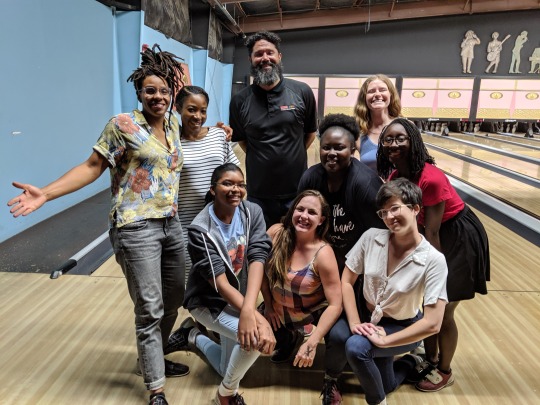
0 notes
Text
An Interracial Reading of Ed & Stede
After writing about how the racial dynamics of Ed's character in the show affect his choices, it got me thinking about the interracial romance dynamics set up between Ed and Stede. (This is a little more Stede focused than Ed since I already wrote about Ed at length)
Unlike some shows OFMD recognizes systems of privilege and oppression in its world. Colonialism, racism, and homophobia all exist-but no marginalized person in the show is forced to have an arch revolving only around these oppressive forces. The sea within the show, is especially used as a metaphor-and transgressive space where some of these oppressive forces lessen in power, or are more easily resisted. (I.E. Calico Jack's comment "Anything goes at sea" in reference to homosexuality). The show has deliberately set up piracy to be an anarchistic, and rebellious force to traditional society's colonialism and heteronormativity-which is a key element to how Ed and Stede come together.
Stede clearly comes from a place of white, male, and wealthy privilege. It lends itself to a lot of arrogance that he charges into situations with, and a very valid reason much of the crew and other characters are frustrated with him. He isn't afraid to invade spaces which often belong to marginalized people, the poor, POC, and women (Like Spanish Jackie's).
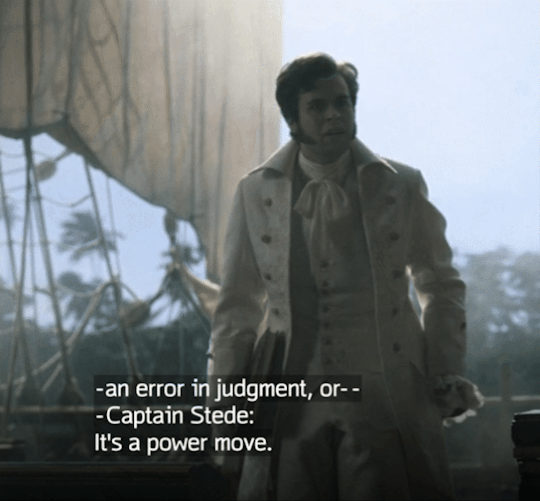
He underestimates piracy is often a forced profession (as told to him by Olu in episode 1) to those in the most marginalized positions. He can be dismissive of the crew's frustrations or worries often (fails to notice when they are in danger like Lucius going missing)-and doesn't often comprehend how racial violence works. When the English Officers are making microaggressive comments against his crew in episode 1 he does appear uncomfortable, but also fails to entirely understand the weight of those insults to his crew or stand up against them (even if it would've been dangerous). The indigenous group are right to be wary of him in episode 2 and address his internalized bias and racist reaction when he assumes they are cannibals which ate the hostages. He is a self-focused white man, even if he is capable of emotional intelligence and empathy with others.
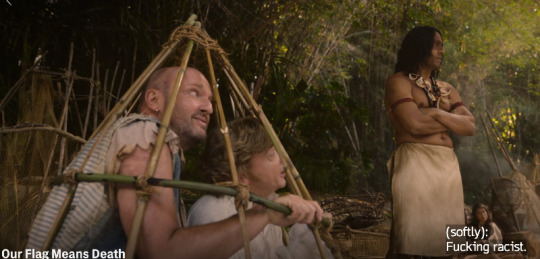
Rightfully so, the Revenge crew has plenty of reasons to want to mutiny and kill him-as a privileged outsider who's impulsive decisions, and invasion of space for the marginalized, is going to put all their lives in danger (as he does in episode 3 on the Spanish Ship).
Despite his very expected of-the-time-period (And unfortunately still persist in modern times) ignorance, privilege, and microaggressions Stede still appears to be an outlier of the elite white men of his society. Unlike the English, or French aristocrats he does not showcase any overt prejudice to members of his crew-and even seeks out their advise and council (when his own excitement hasn't gotten him to make an impulsive decision). In fact by coming to sea-Stede surrenders a degree of his privilege, since it is the pirates like Spanish Jackie, Blackbeard, Calico Jack, and even Izzy who through experience and physical force have earned the most power and respect on the high seas. Being a white, wealthy, man doesn't carry the same immediate access to power as it does in Barbados-and Stede is seemingly willing to make to make that sacrifice to learn along the way. While part of this must be a-credited to the excellent writing on the show more focused on creating a modern, inclusive, experience-credit must also be given to the writing for showcasing historical subtext which demonstrates why Stede would have more progressive viewpoints.

Throughout history, there are multiple instances where marginalized groups end up bonding together-because they're all pushed to the outskirts of society. It makes sense a lot of the most staunch abolitionists of the 19th century (amongst white people-since there were plenty of POC who did the majority of the work) were women. Enduring discrimination is painful, but can have the affect of building empathy-which seems to have been one of the effects in Stede's case. Episode 1 establishes what a menace Stede is to his more marginalized crew-but it also importantly showcases how intensely marginalized Stede was in his own society. Stede experienced abuse in his own house AND from his own peers due to his overt lack of traditional colonial masculinity.
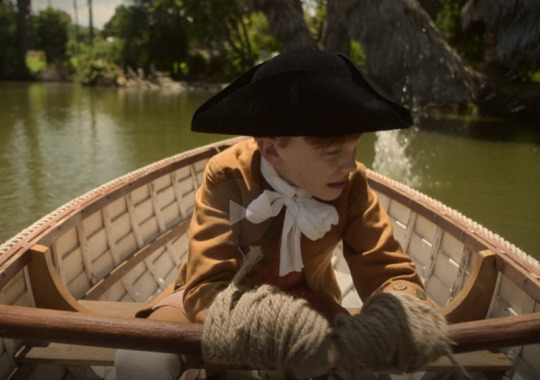
We're told he cries easily and picks flowers (Stede confirms he did), which make him the ire of the more traditionally masculine boys in his school, and provokes their physical and mental abuse. Stede's queerness has ostracized him from his society and some elements of his privilege ever since he was a boy.
While his marriage does not continue his overt abuse-it's a further situation of Stede trying to exist in a colonial role that is just miserable for him as a queer man. What's interesting to how Stede responds to his marginalization though-is he chooses to walk away from the abusive heteronormative, colonial, society-rather than become embittered (and lashing out-which he does do once he tries to return in episode 10) trying to exist in it. It's part of the reason he feels a kinship to the other pirates (even if it isn't alway reciprocated or over-assumed on his part), and finds life more comfortable amongst others who have also been outcasted from colonial traditional society. He finally has a space he can be openly queer (Not in the immediately seducing men sense-but in ignoring the demands of traditional masculinity sense)-because it is a transgressive space in and of itself. I would argue one of the most important pieces of Stede's arch in the show-is realizing resisting the colonial, violent society he was told is normal-is not something to feel guilty about-but needed for justice and happiness.
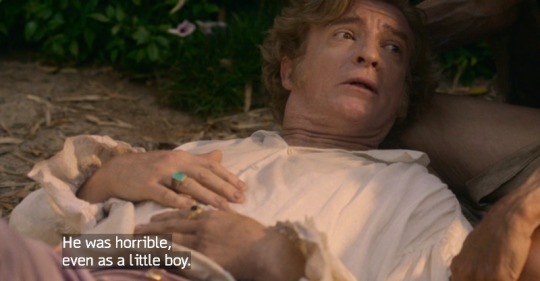
As much as Stede questions what he's done or who he is becoming upon killing Nigel, when he actually pauses to consider his death-he finds he doesn't feel guilty at all about it. He recognizes what an abusive and horrible colonial force Nigel was. What he really feels guilty over is the harm he could've caused to leaving his family vulnerable without him-or I would argue-the overall guilt he feels each time he transgresses against the traditional societal role he was told he should respect. It's here, he begins to let go of his privilege that was apart of that abusive colonial system, which also abused him.
Enter Ed. After hearing stories of his success and adventures, and freedom of anarchy Stede is instantly starstuck by the idea of Blackbeard before even meeting him. Ed is equally intrigued by Stede before they meet-someone who doesn't seem to be overwhelmed by his reputation-and also an apparent 'gentleman' at sea-a persona difficult to exist in a hyper-violent power structure of pirates. I would argue Ed's initial interest in Stede is split between that intrigue-and as we learn at the end of episode 4-his plan to kill him and steal his wealth & assets. And why wouldn't he? As far as he knows Stede is just another wealthy white man who would put him down the moment he gets a chance.
That is until Stede wakes up. As others have pointed out, immediately, without even knowing he is a Captain Stede treats Ed with respect as though they are equals. Ed is clearly perplexed by that, and it extends his fascination toward Stede even though he is still heavily invested in his long-con. However it's when Ed shows interest in the untraditionally hyper-masculine fabric-and Stede responds not only with equal adoration, but invites Ed into his secret cabinet of more, his perception of Stede begins to shift. Stede is not the same as the previous condescending white aristocrats Ed has come across previously who would've never invited him to touch their things-none the less wear them in the next scene. Their clothes swapping also gives us the visual cue of the equal playing ground Ed and Stede meet at on the sea. Stede still carrying some of the power of his wealth and whiteness, and Ed carrying the power earned from being Blackbeard for years, and the biracial influence able to earn loyalty from pirates of different identities across the board. Not at all how it would have been if they met in Barbados.
From there, relieved to find someone who has an appreciation for the same untraditionally masculine interest they share-the pair open up further. Sharing their mutual exasperation with the role they've been forced into by society, due to their marginalization.
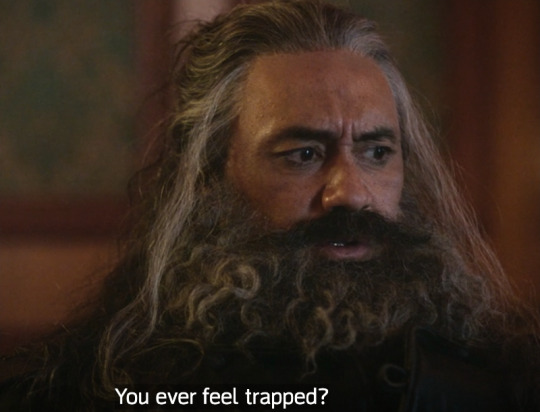
By the end of the episode-bonding on their mutual eccentricities they've developed in response to learning to cope and make life interesting for themselves-Ed is already beginning to doubt his plan. It's obvious on his face when he turns from Izzy after sharing his plan to murder Stede. This long-con of playing hyper-violent, hyper-masculine, to survive has become draining.

The following episode we get an instance of Ed learning high class manners from Stede for said con, when a French Officer racially insults him referring to him as "Donkey". While Stede recognizes Ed is upset-he does not seem to understand entirely why it's so deeply harmful to him. Clearly having an old wound reopened Ed is especially eager to go to the fancy French aristocrat party to prove to himself, and perhaps even Stede, he can be more than those insults. That he could even pull off the con if he suceeds.
Initially, Ed is proud he's somehow outdid Stede at the party, a white man in his own element, by being more 'liked' at the party. Stede however, knowing society well, is most likely familiar enough to be wary of the overt or passive aggressive racism that exists in these spaces. He warns Ed they can be fickle. We know first-hand he's been mistreated for his own version of masculinity, so he's more aware of what discrimination looks like in this setting, as opposed to the previous microaggressions he underestimated from the officers He's not at all surprised when Ed leaves the party distraught-and his desire to get revenge on the French aristocrats is an extremely huge shift for him and Ed.
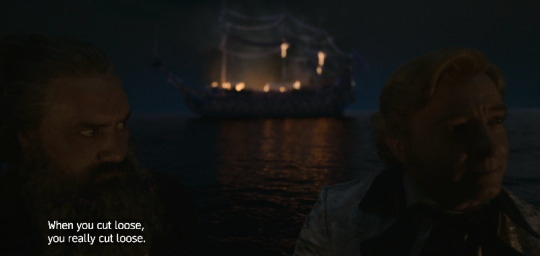
While the comedy of the scene is overt-many have pointed out Stede is shockingly unfazed with the obvious destruction and clearly loss of life on the French ship. It's burning behind them as people jump into the sea and Stede smiles proudly. It's a massive change from Stede's panicked response to 'accidentally' killing Nigel. He's quite content-proud of himself! Just like Nigel, the aristocrats represent and showcase colonial violence, their deaths are all played for comedy and without sorrow (unlike Karl or Lucius) because the show is so anti-colonialist-and has no sympathy for those who represent it. While Stede struggles to feel righteous anger for himself in terms of responding to Nigel's oppressive force-he is plenty able to on Ed's behalf.
For Ed, this act completely changes how he sees Stede. In this scene, Stede has not only demonstrated he is willing to be rough and fight back when needed (not just a simple tender rich man), but he willing to betray his own class and race for Ed. "Cut loose" is a significant line-cut loose as in-have fun, be unhinged, but also cut ties from his own people. It's only BECAUSE Stede does this we can even have the moonlight "you wear fine things well" scene. Ed no longer sees Stede as a rich target he won't feel bad taking out-he sees someone who cares about his feelings and willing to resist the forces colonialism with him and more importantly FOR him.
"You wear fine things well" is an unwitting seduction on Stede's part-because to Ed it is reassuring him-he is just as fine, worthy, and precious as he hoped to be as a boy. Stede is showcasing he does not view Ed in the stereotypes of his race at all, which have marked many of Ed's interactions at sea for the majority of his life. By the end of this episode Ed is infatuated with Stede: they're similar in their eccentricities, Stede empathizes with his plights, and he's enchanted by his courage to defy convention. Not that he'll ever lay his heart bare to tell Stede at this point. Especially when he sees Stede doesn't go in for a kiss like he does. He's never had this kind of equal and relatable relationship with another person-and most likely never assumed it would be with a white man.
So he starts flirting.
Many have pointed out the "Stab me" scene is clearly Ed's attempt to flirt-to get Stede physically close to him, it's also demonstration of how in a hyper-masucline setting so much bonding is done via violence. We can imagine this may have been how the sexuality went between Calico Jack and Ed. But Stede's version of masculinity, romance, etc, is so different from this high seas violent courtships-the attempt goes over his head. That's why Ed is agonized with the push to kill him by Izzy in episode 6. He does his best to convince himself, like Izzy says, Stede is a pet, a passing infatuation/lust, but the reminder of his childhood trauma from the 'fuckery' is too much to bear. Stede is not like his Father, or other white men he's killed, he's Stede, he listens, he's already protected and defended Ed once-and joined Ed in his absurd behavior stepping outside of all masculine expectation with him, so he's willing to open up and tell Stede what happened-especially since Stede seeks him out after his panic attack.
Obviously this is an extremely intimate scene on its own, but the fact Stede is someone Ed can fall apart in front of, cry, express his distain for the tenants of his own power, brings Ed even closer to him. This kind of emotional showcase would've had the opposite effect with any other men Ed knew as Blackbeard. But unlike Jack, or Izzy, Stede makes so much space and empathy to comfort Ed's emotions. It's not often a man of color's vulnerable emotions are put on screen as a central important plot point to be given weight and tender time to.
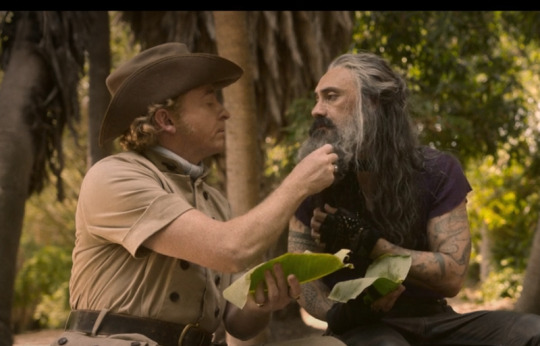
It's worth noting how Ed being the seducee and attempting to anxiously win back Stede's affections is a departure from historically racist depictions of interracial romances on screen. Quite often in the past we saw the POC member of a pairing containing a white person, was often characterized as being more animalistic, rough, or aggressively sexual. While Ed is clearly more traditionally masculine and hardy as pirate-he's given the role of the infatuated one-the one pining tenderly (plus we see Stede commit more violence on screen than we do Ed!). Ed's given a beautifully rich emotional score of being romanced, in a setting on the sea where the pair have equal footing of privilege. They're pair of equals bonding over their odd (to everyone else) behavior.
While Ed refers to himself as a Kraken, a mythical monster-that imagery is part of the racialized violence he'd endured all his life. The fact in that scene Stede does not reinforce that imagry but instead tells Ed he's his 'friend' is so monumental for Ed. As someone who has been on a journey of learning violence is at times unavoidable to survive against oppressive forces, Stede answers Ed's murder plan with empathy and relief. It completly undercuts the racist idea that either one of them is more 'naturally violent' with Ed in tears over the fact he no longer wants to commit murders to survive. Ed's humanity and tender emotions are put at the forefront of the show multiple times-asking the audience not to stereotype him in a caricature-even if other white characters are willing to. (Which is why fan depictions that lean into making him a literal monster are regressive at least, and racist at worst)
Episode 7 and 8 really showcase how Ed has no idea what to expect of Stede. He spends most of episode 7 feeling rejected and far too vulnerable (after that bathtub confession), since Stede has not openly returned his flirtations (And perhaps rightfully wary from his previous experiences with white men) and it is only when Lucius spells out to Ed that the entire expedition is meant to be a gift to Ed from Stede, he relaxes. Once he knows Stede is somehow returning his affections, he reconsiders his plan of running away and agrees to co-captain with him.
When Calico Jack shows up in episode 8 he throws a wrench in everything-but also provides us interesting backstory for Ed and his relationships with white men. He tells Stede "You two have a lot in common", which can seem like a humorous throw away line since Jack and Stede couldn't be more different in their presentation of masculinity. I would argue what Ed sees and is referring to-is that Jack and Stede are two white men who seem extremely uninterested in prescribed colonial masculinity and that is what stands out to Ed. That isn't to say Jack's version of toxic, violent, frat-boy, immature, masculinity is healthy-but Ed can recognize they are both outliers from proper navy officers. (Ed's perspective is demonstrated in episode 9, when he tells Chauncey "you all look alike", a joke yes, but also how much these proper colonial white men blend together for Ed.)
Stede has made enough of an impression on Ed though-and shown him such a space of alternative masculinity-he is willing to sacrifice EVERYTHING for him by getting back on the ship instead of rowing away with Jack. Once again the English officers attempt to re-affirm their structure of colonization on the sea-such as when Chauncey tells Ed "He's from my world not yours" in regards to having the right to execute Stede. Ed however returns the previous gesture of Stede's- betraying his legacy as a pirate by taking "An Act of Grace".
Piracy is once more a metaphor for colonial resistance since Chauncey attempts to argue Stede isn't a 'real pirate' and therefore can not have an "Act of Grace". But once again we see Stede's chaotic, more tender version of masculinity shine through, as his 'piracy' is proven from his simple abduction and nourishment of a plant-not any amount of bloodshed. Chauncey throws a fit, as it is another example of piracy and masculinity not playing by traditional colonial rules.
Despite being thrown back into a colonial setting at the reform school-Ed and Stede are now in position where both have been entirely stripped of their power. It is what lets them kiss on the beach without the imbalanced power dynamics of colonial society-and just themselves. It's truly touching moment because it's the pair of them wanting each other, even without all their fineries or power attached-which is why they're in the same outfit. It's a really remarkable way of doing an interracial relationship in media-Ed and Stede's power dynamics are communicated via their outfits throughout the show.
When Stede chooses to return to his family-it's only after he receives a scolding, for betraying the colonial role he was given (A Father, obeying naval officers, etc) he chooses to leave Ed feeling such immense guilt for straying from his designated role and privilege (plus the idea his tender form of masculinity as emasculated Blackbeard). There's even an element of white privilege Stede is able to return his comfortable life immediately, rather than being tracked down by the English for abandoning his post. But once home, the show demonstrates so well-and Stede can finally acutely see-he never belonged in this abusive colonial system. And the people who manage to find happiness within it-only do so by deviating (Mary having her affair, widows riding themselves of toxic husbands, etc) from that abusive system's demand. Stede leaves Barbados, free of guilt from Chauncey's death, and walking away from the abusive system this time recognizing it is the right thing to do. Most significantly, Stede relinquishes one of the sources of his colonial privilege-wealth.

It's a complete commitment to change, the world of piracy, and Ed. It's Stede finally recognizing violence against colonial forces (such as killing the Badminton twins) is needed, because they are so oppressive and violent in and of themself. It's Stede recognizing walking away from colonial forces (the heteronormativity of his previous life) is needed for happiness and freedom-and that includes sacrificing the comfort of wealth. Stede returns to the sea without the pomp and flash of his former privilege, ready to commit to a life of rebellion with Ed, against that world. It makes sense coming from this place of privilege, and choose to let it go (rather than having it revoked) Stede finds himself in a 'happy' ending at the end of Season 1.
Ed however, is ending the season feeling the brunt of colonial violence. Stede leaving him (which we can perceive is how he sees the interaction, since if he imagined Stede dead he probably wouldn't of thrown out all his things) is an example of Stede behaving how Ed feared an upper class white man would see him as. Disposable, which is what drove his anxiety in episode 8 to leave with Jack "You would always see what I am". Ed has been trying to avoid being hurt this entire relationship with Stede and he failed. Izzy's threat, another example of white violence, pushes Ed over the edge to make him shut down completely to protect himself all this white violence. It's a violent change for Ed because not only did he believe someone saw him past all the stereotypes he'd been pushed into in his life-he also must be furious at himself he dared to think Stede could be better than his previous interactions with white men.
Ed has every right to be furious and feel deeply betrayed. I would even argue he has every right to attack Izzy after Izzy spent so much time threatening him and berating his new-found more tender masculinity. It's worth noting if you watch Ivan and Fang in episode 6 they remark how nice it is to see Ed so 'open and available' and when Ed is singing in episode 10, Fang watches on with a tender sympathetic expression. The other men of color understood how monumental it was for Ed to have a chance to be seen as more than just a vehicle of violence. Unlike some people I don't think 'utterly heartbroken in a robe singing sad songs Ed' is 'true' Ed entirely. I think he still has plenty of chaos and anger against colonialism in him-but surviving via violence and constantly bearing his teeth has grown draining for him, and he would prefer to be softer and more expressive if he has the choice.
Stede completed his arch resisting colonialism-so I wouldn't be surprised if we DO get season 2 from Ed's POV. Stede's ignorance is part of the reason he did not pause to consider as much as he thought leaving Ed would help him-would also wound him. Stede returned to his privilege and power, and while it finally helped him see the light-it caused an immense amount of harm to Ed-and did not consider how deep his feelings were at all. It would be likely in a show that has done so well to set up a stage that an interracial relationship can flourish challenging previous structures of power, and putting two wildly different men on the same power level-it now shifts to the man who's at the crisis and crossroads of his identity like Stede was at the start of season 1. It's my hope season 2 would conclude with the pair of them standing firmly in their identities, knowing they can exist outside of the role colonialism attempted to press them into.
#ofmd#our flag means death#edward teach#stede bonnet#blackbonnet#ofmd meta#poc of ofmd#shit this is LONG#I'm sorry but this show is brilliantly written i had to scream#also#stop making Ed into a literal monster#PLEASE#this is very stede focused since I already wrote at length on Ed#my writing
2K notes
·
View notes
Text
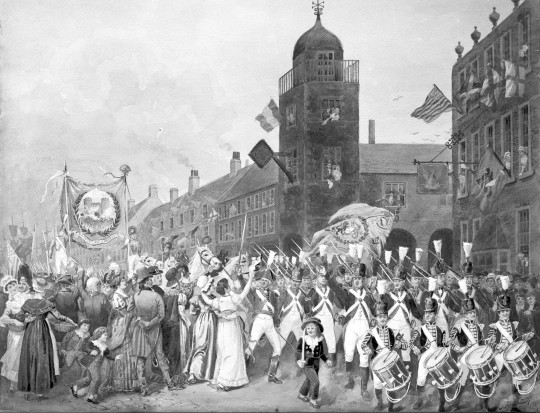

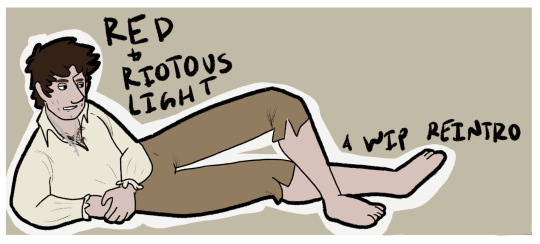

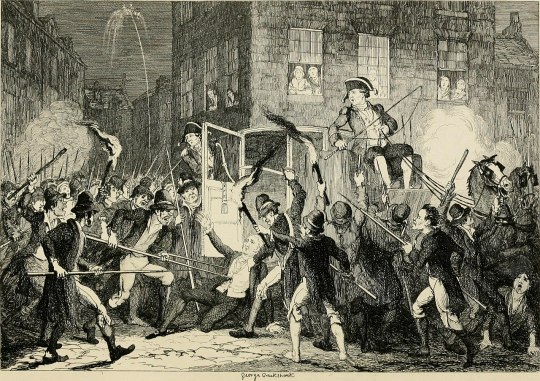
image in the middle my art, all others except for that of the belfast 14th july celebrations from pinterest
WIP Reintro: Red and Riotous Light
Status: seven morbillionth draft
Genre: historical fiction, gothic horror
Content warnings: gore, death, cannibalism, place & time typical bigotry, &c
The year is 1796 and the island of Ireland, once considered peaceable, is awash with sedition. In Belfast, the arrival of a mysterious Englishwoman whose defection to the French makes her a target of both curiosity and suspicion brings with her tidings of a prospective deal between a local United Irish cell and the French government: guns, and ammunition, sold at a premium price, delivered by a French ship. The only problem? The ship is arriving at the opposite side of the country, and these would-be insurgents need it where they are -- and the French said nothing about transport. Additionally, the committee seems to have had a suspicious number of brushes with authority lately. More than they used to. Hopefully someone isn't getting cold feet...
Meanwhile, in the isolated townland of Áth Síomóin, the arrival of a hapless new schoolmaster sparks the powder-keg the two sides of the area's sectarian divide have long been sitting on and leads, inadvertently, to the death of a Catholic of some consequence -- and, crucially, does not lead to the punishment of his killer. The resulting crackdown on Defender activity, facilitated by the arrival of another English visitor, is to be expected at first. However, as the situation deteriorates, it becomes clear that local agrarian resistance leaders have neither intent nor indeed means to capitulate, and all sides begin to adopt increasingly extreme measures in an attempt to win the seemingly endless feud. And there's also something off about some of the local children -- hearing voices, saying funny things. It can't be good for them, after all. All this bloodshed.
Ask to be +/- from the taglist + main characters under the cut
William Hughes Rearden - an extremely driven and neurotic member of the Belfast United Irishmen hellbent on getting French arms for his men. he/him
Lady Maria Whittaker - an English reformer who defected to the French; Rearden's close friend. Her mission is to arm the UI and she doesn't care what she has to do to accomplish it. she/her; first name pronounced "mariah"
Seamus "Seamy" Breen - a small, unhappy Irish Catholic boy who, after he witnesses the death of a schoolmate, develops the ability to speak to the dead. he/him; nickname pronounced "shaymie"
Eoin O'Donnell - a womanising Defender leader in Áth Síomóin who has decided that he will also be taking and using some of these French arms, actually. he/him; first name pronounced "owen"
Sarah Connolly - a nihilistic Catholic peasant woman trapped in an unhappy relationship with an abusive boyfriend, who knows much more than she lets on. she/her
Edward "Lazarus" McClure - the loyalist owner of a rural inn who has lately betrayed his principles for a Catholic boyfriend who he seems disturbingly devoted to. he/him
Elizabeth "Eliza" Durham - the heiress to the fortune of an Anglo-Irish landowning family who runs her family's estate like it's the navy and suffers little dissent. she/her
Anthony Franklin - an actor, committed abolitionist, philosophy enthusiast, and London Corresponding Society delegate originally from the West Indies. he/him
Charles Nathaniel Maurice Irving-Hamilton, Lord Drenning - a foppish English soldier brought over by Eliza to help quell agrarian disturbances. Really really bad at his job. he/him
Eleanor "Ellie" Gage - a waif of uncertain background who lives with the Presbyterian minister in a neighbouring townland and works unofficially for the local regiment. she/her
29 notes
·
View notes
Text
rubynye replied to this post:
Olaudah Equiano: enslaved as a child, bought his own freedom, campaigned eloquently for abolition, his memoir went through nine printings at least. An erudite Black man from before many people think Black people were invented. I can't adequately express how happy seeing him in your list made me.
Equiano is a truly fascinating, compelling figure. His memoir was assigned in a grad school seminar I took on 18th-century British literature focused on various forms of resistance and dialogue among/between/about the oppressed, and it was really intriguing to read abolitionist poetry and tracts mainly by white English people across the political spectrum of their era and then Equiano's Interesting Narrative. The contrast is incredible.
He's in my dissertation for basically one passage—the account of his capture and lifelong separation from his sister. But it's a hell of a passage.
(Now that I'm thinking about it, he was also in the curriculum I designed when I took over my advisor's upper-division 18th-century class for a semester, and my undergrad students loved the Interesting Narrative, way more than the grad students in my own seminar had. Most of my students had no idea he'd even existed and they just really got into it.)
#rubynye#respuestas#olaudah equiano#eighteenth century blogging#ivory tower blogging#cw slavery#the interesting narrative of the life of olaudah equiano#nice things people say to me
28 notes
·
View notes
Text

The strong presence of the sea is grossly under-examined in American literature, doubly so in African American literature. As Elizabeth Schultz observes, "Historically and culturally, the African American experience has been an inland one. Black Americans," she continues, "have not generally turned seaward in their literature." Although she comes to a "however" that adds the observation "the sea is not absent from African American literature," the rhetorical pose imagined in the claim that "the sea is not absent" is that it will take a good deal of searching to find it. And yet, as Jeffery Bolster observes in his ground-breaking 1997 study Black Jacks, "Sailors wrote the first six autobiographies of blacks published in English before 1800". Many of these autobiographies carry clear abolitionist intent and hint at the type of anti-slavery discussions carried on by sailors around the Atlantic world. When scholars of African American literature turn their attention to works written by sailors, like Olaudah Equiano's The Interesting Narrative of the Life of Olaudah Equiano, or Gustavas Vassa, the African. Written by Himself (1789), most suffer from the misplaced assumption Schultz points to, and thus fail to see the crucial link between sailors and black abolitionism. Indeed, what Crispus Attucks, Paul Cuffee, Robert Smalls, Frederick Douglass, and so many other black revolutionaries in America have in common is that they were all sailors or in some other way directly connected to the maritime trades.
— Matthew D. Brown, 2013. “Olaudah Equiano and the Sailor’s Telegraph: The Interesting Narrative and the Source of Black Abolitionism.” Callaloo: A Journal of African Diaspora Arts and Letters 36 (1): 191–201. doi:10.1353/cal.2013.0059 (Google Drive link)
‘Drunken Sailors’ by John Locker, 1829 (NMM)
#age of sail#black history#black sailors#sailors#naval history#maritime history#atlantic world#abolitionism#black jacks#olaudah equiano#john locker#maritime art#black history month
178 notes
·
View notes
Text
Bay Area elementary school where just 4% of students are proficient in math and 12% in English spent $250K on 'Woke Kindergarten' program where third-grade teacher was told to 'disrupt whiteness', and whose non-binary creator wants to abolish police
Glassbrook Elementary in Hayward spent $250,000 on a ' Woke Kindergarten' program only to see its student's literacy and numeracy rates plunge
The program states its mission as an 'abolitionist early learning ecosystem' that trains teachers to uproot white supremacy, disrupt racism and oppression
The for-profit company was founded by non-binary early educator Akiea 'Ki' Gross who previously hit headlines when their audiobook for children suggested kids should not feel safe around police
Comment: Wow
26 notes
·
View notes
Text
[D]omesticated attack dogs [...] hunted those who defied the profitable Caribbean sugar regimes and North America’s later Cotton Kingdom, [...] enforced plantation regimens [...], and closed off fugitive landscapes with acute adaptability to the varied [...] terrains of sugar, cotton, coffee or tobacco plantations that they patrolled. [...] [I]n the Age of Revolutions the Cuban bloodhound spread across imperial boundaries to protect white power and suppress black ambitions in Haiti and Jamaica. [...] [Then] dog violence in the Caribbean spurred planters in the American South to import and breed slave dogs [...].
---
Spanish landowners often used dogs to execute indigenous labourers simply for disobedience. [...] Bartolomé de las Casas [...] documented attacks against Taino populations, telling of Spaniards who ‘hunted them with their hounds [...]. These dogs shed much human blood’. Many later abolitionists made comparisons with these brutal [Spanish] precedents to criticize canine violence against slaves on these same Caribbean islands. [...] Spanish officials in Santo Domingo were licensing packs of dogs to comb the forests for [...] fugitives [...]. Dogs in Panama, for instance, tracked, attacked, captured and publicly executed maroons. [...] In the 1650s [...] [o]ne [English] observer noted, ‘There is nothing in [Barbados] so useful as … Liam Hounds, to find out these Thieves’. The term ‘liam’ likely came from the French limier, meaning ‘bloodhound’. [...] In 1659 English planters in Jamaica ‘procured some blood-hounds, and hunted these blacks like wild-beasts’ [...]. By the mid eighteenth century, French planters in Martinique were also relying upon dogs to hunt fugitive slaves. [...] In French Saint-Domingue [Haiti] dogs were used against the maroon Macandal [...] and he was burned alive in 1758. [...]
Although slave hounds existed throughout the Caribbean, it was common knowledge that Cuba bred and trained the best attack dogs, and when insurrections began to challenge plantocratic interests across the Americas, two rival empires, Britain and France, begged Spain to sell these notorious Cuban bloodhounds to suppress black ambitions and protect shared white power. [...] [I]n the 1790s and early 1800s [...] [i]n the Age of Revolutions a new canine breed gained widespread popularity in suppressing black populations across the Caribbean and eventually North America. Slave hounds were usually descended from more typical mastiffs or bloodhounds [...].
---
Spanish and Cuban slave hunters not only bred the Cuban bloodhound, but were midwives to an era of international anti-black co-ordination as the breed’s reputation spread rapidly among enslavers during the seven decades between the beginning of the Haitian Revolution in 1791 and the conclusion of the American Civil War in 1865. [...]
Despite the legends of Spanish cruelty, British officials bought Cuban bloodhounds when unrest erupted in Jamaica in 1795 after learning that Spanish officials in Cuba had recently sent dogs to hunt runaways and the indigenous Miskitos in Central America. [...] The island’s governor, Balcarres, later wrote that ‘Soon after the maroon rebellion broke out’ he had sent representatives ‘to Cuba in order to procure a number of large dogs of the bloodhound breed which are used to hunt down runaway negroes’ [...]. In 1803, during the final independence struggle of the Haitian Revolution, Cuban breeders again sold hundreds of hounds to the French to aid their fight against the black revolutionaries. [...] In 1819 Henri Christophe, a later leader of Haiti, told Tsar Alexander that hounds were a hallmark of French cruelty. [...]
---
The most extensively documented deployment of slave hounds [...] occurred in the antebellum American South and built upon Caribbean foundations. [...] The use of dogs increased during that decade [1830s], especially with the Second Seminole War in Florida (1835–42). The first recorded sale of Cuban dogs into the United States came with this conflict, when the US military apparently purchased three such dogs for $151.72 each [...]. [F]ierce bloodhounds reputed to be from Cuba appeared in the Mississippi valley as early as 1841 [...].
The importation of these dogs changed the business of slave catching in the region, as their deployment and reputation grew rapidly throughout the 1840s and, as in Cuba, specialized dog handlers became professionalized. Newspapers advertised slave hunters who claimed to possess the ‘Finest dogs for catching negroes’ [...]. [S]lave hunting intensified [from the 1840s until the Civil War] [...]. Indeed, tactics in the American South closely mirrored those of their Cuban predecessors as local slave catchers became suppliers of biopower indispensable to slavery’s profitability. [...] [P]rice [...] was left largely to the discretion of slave hunters, who, ‘Charging by the day and mile [...] could earn what was for them a sizeable amount - ten to fifty dollars [...]'. William Craft added that the ‘business’ of slave catching was ‘openly carried on, assisted by advertisements’. [...] The Louisiana slave owner [B.B.] portrayed his own pursuits as if he were hunting wild game [...]. The relationship between trackers and slaves became intricately systematized [...]. The short-lived republic of Texas (1836–46) even enacted specific compensation and laws for slave trackers, provisions that persisted after annexation by the United States.
---
All text above by: Tyler D. Parry and Charlton W. Yingling. "Slave Hounds and Abolition in the Americas". Past & Present Volume 246, Issue 1, pages 69-108. February 2020. [Bold emphasis and some paragraph breaks/contractions added by me.]
#abolition#its first of february#while already extensive doumentation of dogs in american south in 1840s to 60s#a nice aspect of this article is focuses on two things#one being significance of shared crossborder collaboartion cooperation of the major empires and states#as in imperial divisions set aside by spain britain france and us and extent to which they#collectively helped each other crush black resistance#and then two the authors also focus on agency and significance of black resistance#not really reflected in these excerpts but article goes in depth on black collaboration#in newspapers and fugitive assistance and public discourse in mexico haiti us canada#good references to transcripts and articles at the time where exslaves and abolitionists#used the brutality of dog attacks to turn public perception in their favor#another thing is article includes direct quotes from government and colonial officials casually ordering attacks#which emphasizes clearly that they knew exactly what they were doing
21 notes
·
View notes
Text
The famous anti-slavery token made by the Wedgewood pottery in 1787 entitled 'Am I not a Man and a Brother?' was popular among abolitionists in England. But it would be 1838 before a coin was struck for enslaved women's rights – 'Am I not a Woman and a Sister?' – and then it was made for the American Anti-Slavery Society and popular in America.

English elite women did not feel a sisterhood with women of a lower class or another race. Elite women called for political rights for their own class, not for anyone else. They even used the example of slavery to support their campaign – comparing their inequality to slavery.
"Normal Women: 900 Years of Making History" - Philippa Gregory
#book quotes#normal women#philippa gregory#nonfiction#anti slavery#token#wedgewood pottery#80s#1780s#18th century#am i not a man and a brother#abolitionist#england#30s#1830s#19th century#coin#am i not a woman and a sister#american anti slavery society#classism#white feminism#slavery#sisterhood#solidarity
19 notes
·
View notes
Note
Do you have any thoughts on what's up with hussie obsession with combining established characters in the latter half of the comic? Davepeta, Jasprose, Lord English, all the rest of the alpha kid sprites? If that goes towards a discussion of Ultimate Selves, why is the most complete version of yourself someone who isnt even solely you anymore? Love your analysis!
Hello, welcome! Here's a couple approaches:
Sprites, like other alt-selves, can serve the elaboration of self-loathing: Characters want to be happy and are very scared that they are incapable of being happy. Seeing a version of themselves that achieved happiness by integrating another person can be a nightmare, seemingly confirming that misery is a defining feature of their existence. AR mocks Dirk in these terms, leveraging both his alleged supercomputer brain and his integration of Equius to make Dirk feel inferior, intrinsically lacking. Though in Vriska's case, the lack of modification on (Vriska) was also infuriating: their sameness meant that Vriska was not, as she likes to claim, the way she is entirely out of necessity. Alternate selves have a way of making people question themselves, mingled or no.
Sprites provoke an audience response: fans get angry when characters are diluted, be that through prototyping sprites or through "mischaracterization", flanderization, or other unpopular modes of personality change. Rose might call this protecting the brand. So you could allege, as the guys on HMTW occasionally do, that this gesture of defying brand integrity is calculated to raise reader engagement by corrupting a quality of the narrative that readers are invested in. It's a method of trolling.
It's a race-mixing joke: The word "miscegenation" (which replaced the earlier “amalgamation”) was originally coined in an ostensibly abolitionist pamphlet by pro-slavery agents. Their goal was to weaken the Lincoln election campaign by provoking a fear that gene-mixing was the explicit goal of the abolitionists, claiming in the pamphlet that race-mixing created a superior class of being. Insofar as Homestuck is a parody of racist rhetoric, the claim that the Ultimate Self (and the Ultimate Frog) is the product of the endless recombination of divergent selves seems downstream of this sort of sexualized racial fear-mongering -- Rose's ascension (ie her dilution) in the Epilogues plays into this by casting Kanaya as the impotent white cuck against Dirk's black stud: "Hes Going To Take Good Care Of Rose; Probably Much Better Than Id Ever Be Able To" is euphemism for sexual potency. (Cuck jokes have followed Kanaya since her early chatlogs: recall the phrase "Watching Oblong Meat Products Tumble Into Places They Dont Belong") Saturating the narrative with distraught reactions to more abstracted amalgamation serves the story's racial subtext
This isn't by any means exhaustive -- abstract fears of mixing and merging can also be applied to coitus, pregnancy, the blurring of masculine and feminine, etc. The narrative achieves its density and sense of abstraction by applying itself to multiple motifs at once, I tend to think. The different approaches can euphemize one another
19 notes
·
View notes
Text
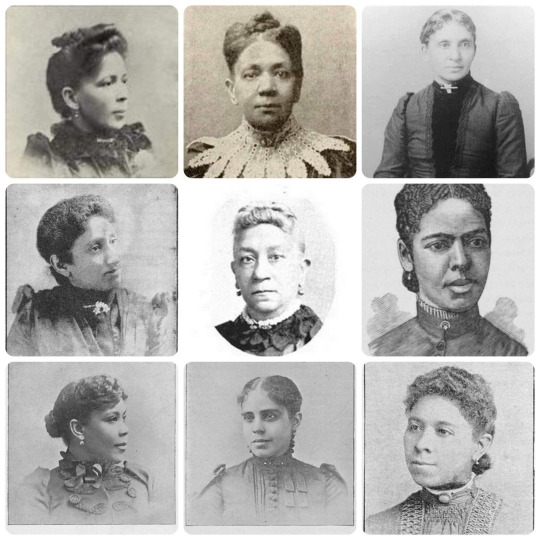
Nine trailblazing women from Monroe A. Major’s 1883 book, “Noted Negro Women Their Triumphs, and Activities.” These women believed in education and became teachers, journalists, and leaders. First row: Della Irving Hayden (1851-1924), was born a slave, graduated from what is now known as HamptonUniversity in 1877. Founded Franklin Normal and Industrial Institute in Virginia in 1904; Fannie Jackson Coppin (1837-1913), born a slave, determined to get an education at Rhode Island State Normal, went to OberlinCollege. Taught Latin, Greek, & math at the Institute for Colored Youth in Philadelphia; Charlotte Forten Grimke (1837-1914), grew up in a prominent abolitionist free black family. Grimke went south to educate boys and girls in South Carolina; Second row: Julia Ringwood Coston, a journalist from Cleveland, Ohio, and editor of Ringwood’s Afro-American Journal of Fashion; Sarah Jane Woodson Early (1825-1907), was born to free parents in Chillicothe, Ohio, enrolled at Oberlin college and graduated in 1856 with a bachelor’s degree to teach English and Latin, taught at WilberforceUniversity; Lucy Wilmot Smith (1861-1889), a writer, educator, historian, editor, suffragist, and journalist. In 1884 became a journalist for the American Baptist, later became its editor; Third row: Rosa D. Bowser (1859-1941), first black teacher hired in Richmond, Virginia, she was a correspondent for The Women’s Era; Mary V. Cook Parish (1862-1945), professor at Kentucky Baptist College, journalist for The American Baptist, editor of Our Women and Children; Frankie E. Harris Wasson (1850-1933), her parents were involved in the UndergroundRailroad, graduated from Oberlin College in 1870, taught for 54 years, was a principal, published a book of poetry in 1886.
35 notes
·
View notes
Text
Fun Pirate Facts!
These are all fun facts in light of Our Flag Means Death. Keep in mind that sources of real-life pirates are usually written from the people trying to stop piracy. They aren't very good.
Stede Bonnet was allegedly one of the only pirates that had people "walk the plank." (Although this isn't 100% confirmed and the whole walking the plank thing may have come later).
Anne Bonny and Mary Read probably were in a romantic relationship while Anne Bonny was in a relationship with Calico Jack.
Both Blackbeard and Stede Bonnet really did take the pardon offered by the English crown before eventually ending up back in piracy.
Pirates have been around for a long, long time. But the "Golden Age of Piracy" in the Caribbean started because sailors were hired as privateers (legal pirates) by various countries trying to get the upper hand in colonizing the Americas. The privateers were basically told to attack other countries' ships. Eventually, the privateers were abandoned by their employers and they turned to piracy. (It's far more complicated than this, but this is the gist of it.)
Pirate ships were fairly democratic. Not always, but especially in the early Golden Age, the captain was often voted in by the crew. A pirate who was especially well known for this was "Black Sam" Bellamy. (And I stg he needs to make anappearance if s3 happens)
Stede Bonnet was one of the only pirates who paid is crew a salary. Normally, pirates would split the loot amongst themselves.
Loot wasn't necessarily treasure and gold and gems like is often portrayed. It was usually luxuries like indigo, sugar, cocoa, etc.
Ed Low SUCKED. He was known to enjoy torturing and killing, which was actually a bit unusual. Pirates were known to steal and kill and use violence, but they normally weren't excessive. Ed Low seemed to just like the power and violence of being a pirate captain. He's the exception to the general rule that pirate ships were mostly run democratically.
It wasn't unusual for pirates to raid slave ships and offer joining the crew to the freed people. A couple pirates known to do this was Black Sam and Blackbeard. That's not to say pirates were radical abolitionists. Trading people back to the slave trade in exchange for something wasn't uncommon either.
In pretty much every version of pirate media, a "Pirate's Code" is mentioned as if it's a list of rules all pirates agreed on. That's pretty inaccurate. There was a general Pirate's Code that varied from crew to crew. But you have to remember most pirates were illiterate. There wasn't a giant book with a Pirate's Code. It was mostly communicated through word of mouth and y'all know how that game "telephone" usually goes.
I can write more if people like this. There's a lot of fun rabbit holes to go down to research.
24 notes
·
View notes
Text
Rooted School Cover Letter
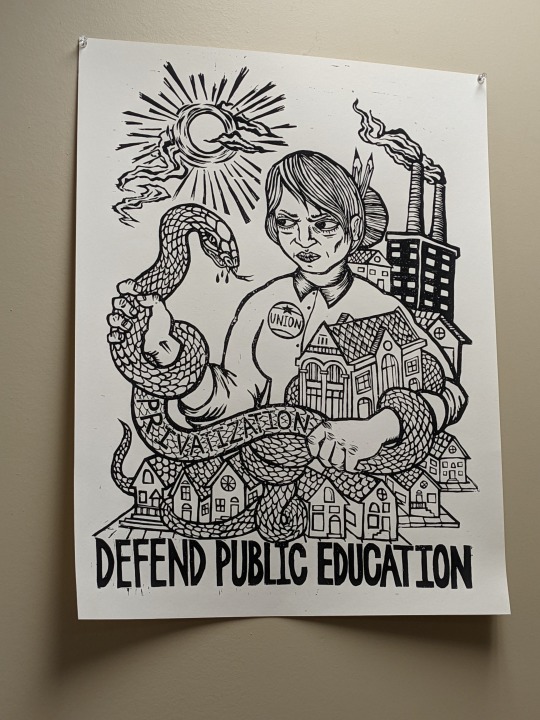
Rooted School
6701 Press Dr. New Orleans, La 70126
July 19th, 2022
Dear Rooted School Hiring Staff,
My name is Keely Hill, and I am a New Orleans educator. I am passionate about literacy, social justice and engaging my students in educational experiences that foster and nurture community. I care deeply about quality public education in New Orleans, and I appreciate the mission and vision that Rooted School acts on in service to its students and community. I am searching for a permanent home for my skills in a school that aligns with my personal values of equity, compassion, kindness, creative thinking and social-emotional wellness for children. It is with this in mind that I request your consideration of my application to join the Rooted School teaching staff.
With over ten years of experience in teaching and educational programming, I have had the opportunity to work with students in Pre-Kindergarten through high school. In the past five years, I have focused my studies and instruction in reading intervention, and most recently I have taken on the role of lead Kindergarten teacher at St. George’s Episcopal School. My experiences with Reading Assist Institute, Xavier University and local New Orleans schools in particular have allowed me to deepen my understanding of how humans acquire the skills of reading and writing. I am passionate about helping students access the skills of reading and writing, and I am also keenly aware of the circumstances that set children up to become confident readers, researchers and writers. This awareness and expertise is something I would love to bring to the students served at Rooted School.
Building relationships and supporting students as they develop socially and emotionally through their educational experiences is a cornerstone of my philosophy as an educator. Having excellent rapport with students and their families is essential to ensuring academic success and the development of a happy and healthy child. I believe I would thrive as an educator and community member at Rooted School. Thank you in advance for your consideration of my request to join your teaching staff. I hope to hear from you all soon.
Sincerely,
Keely Hill
1 note
·
View note
Text
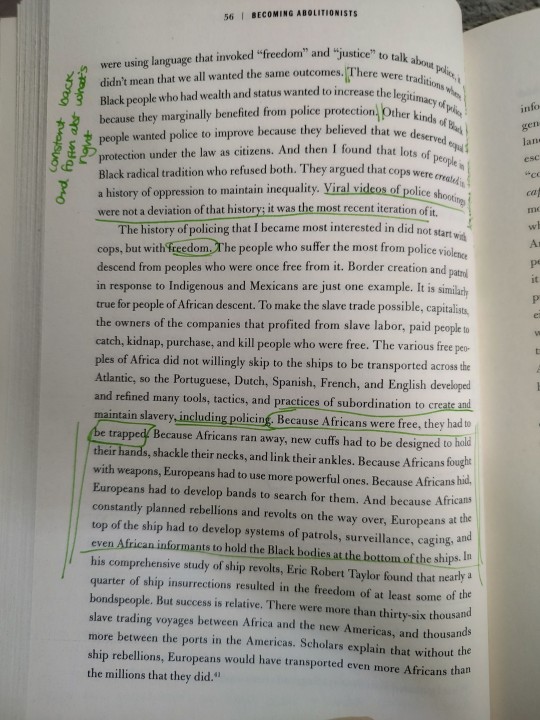
Image ID: page 56 from Derrecka Purnell's book "Becoming Abolitionists: Police, Protests, and the Pursuit of Freedom".
Second paragraph reads:
"the history of policing that I became most interested in did not start with cops, but with freedom. The people who suffer the most from police violence descend from peoples who were once free from it. Border creation creation and patrol and response to indigenous and Mexicans are just one example. It is similarly true for people of African descent. To make the slave trade possible, capitalists, the owners of the companies that profited from slave labor, paid people to catch, kidnap, purchase, and kill people who are free. The various free peoples of Africa did not willingly skip to the ships to be transported across the atlantic, so the portuguese, dutch, spanish, french, and English developed and refined many tools, tactics, and practices of subordination to create and maintain slavery, including policing.
Because Africans were free, they had to be trapped. Because Africans ran away, new cuffs had to be designed to hold their hands, shackle their necks, and Link their ankles, because Africans fought with weapons, Europeans had to use more powerful ones. Because Africans hid, Europeans had to develop bands to search for them. And because Africans constantly planned rebellions and revolts on the way over, Europeans at the top of the ship had to develop systems of patrols, surveillance, caging, and even African informants to hold the black bodies at the bottom of the ships.
In his comprehensive study of ship revolts, Eric Robert Taylor found that nearly a quarter of ship insurrections resulted in the freedom of at least some of the bondspeople. But success is relative. There were more than 36,000 slave trading voyages between Africa and the new americans, and thousands more between the ports in the americas. Scholars explain that without the ship rebellions, Europeans would have transported even more Africans than the millions that they did."
(emphasis mine)
#angel posts#i used voice to text for this so if theres a goof pls let me know#derecka purnell#becoming abolitionists#police abolition#angel reads
12 notes
·
View notes
Text
I really need to read more about history and how life actually was for regular people in different places and time periods because whenever I hear somebody talking about working multiple jobs and barely being able to support themselves it makes me think of that enslaved man in 18th century Viceroyalty of Peru who killed himself because he was working multiple jobs and couldn’t afford to both support himself and his family and pay the amount that the one who enslaved him demanded from him (an accepted practice at the time—at least for anyone who wasn’t an abolitionist). I can understand why the comparison came to mind but surely there are examples closer than that. I suspect, though, that such situations have been rather common, or more common than uncommon, to put it one way.
I spend too much time on the Computer (or more terrible than that, the Phone), so I understand that the English-dominated discussion of current trends in Society, or the Economy, etc, overrepresents the grievances of citizens of countries that have been very prosperous in the past few decades. Those are parts of the world, but they’re not “the” world!
(All of this to say I should read more books and less of what’s on the Computer.)
19 notes
·
View notes